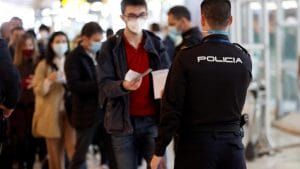Hemingway said that Paris was a party, but in light of the controversy in recent days, the merriment has moved to Madrid . The different administrations pass the buck on the restrictions against the coronavirus while citizens are increasingly indignant with the arrival of young French or Italian people to party in Spanish cities, while nationals have banned the transfer between communities.
The exceptions in which travel is allowed before and during Holy Week and the supporting documents you need
The central government and communities reached an agreement two weeks ago to make the restrictions uniform throughout the country for the San José bridge and Holy Week. Among them, the perimeter closure of all the autonomies during those two periods: no one can leave their region except for justified reasons.
This contrasts with a fact that has been occurring for weeks and that is expected to become more noticeable during Holy Week: the growing arrival of tourists from countries such as France or Italy , who travel for the weekend to Madrid or other cities to enjoy an environment where restrictions are clearly lower than in their countries of origin.
Especially notorious is the case of Parisians, who are currently experiencing severe confinement in the French capital : the closure of non-essential shops, a curfew at seven in the afternoon and movement allowed only within a radius of 10 kilometers.
French people coming to Madrid to party.
Upon arriving in Madrid, Parisians find bars and restaurants open with a capacity of six people per table on terraces, a curfew at 11pm and freedom to move around the community, although without leaving it. “Here’s the party,” a young woman declared upon her arrival in Barajas at the beginning of the month.
Closing of Decks
During much of the third wave, the president of the Community of Madrid, Isaber Díaz Ayuso , has demanded that the central government impose controls so that Barajas stops being “a drain.” In fact, the Executive collected in February a demand from the Community to limit flights from South Africa or Brazil, where the new strains of the coronavirus are dominant.
However, the former vice president of the Government and now candidates from United We Can to the Community of Madrid, Pablo Iglesias , criticized Ayuso on Monday, saying that “in Madrid anything goes.” “Millions of French people can come here, they can go out in the Núñez de Balboa neighborhood without a mask, anything goes here,” he said in an interview on Telecinco news.
Several tourists with coronavirus masks arrive at Menorca airport on a flight from London. The ‘party’ of foreigners to Spain in the middle of the pandemic reaches the EU: Brussels asks for “coherence” with the restrictions.
Even the European Commission joined the controversy on Monday by asking Spain for “coherence” with its measures, and reminded it that free movement is a fundamental right of the EU.
The clearest answer that the Executive has given on this issue was that of the Minister of Health, Carolina Darias , who this Monday affirmed that the Schengen agreement does not prevent mobility between member countries. In any case, tourists, he added, have to comply with the same measures as citizens of the regions to which they travel.
Schengen borders
And it is that one of the pillars of the legal construction of the European Union is freedom of movement in European territory and the abolition of internal borders, regulated by the so-called Schengen Borders Code . European citizens and foreigners with permission can move freely within the entire EU territory, except Bulgaria, Cyprus, Croatia and Romania , which are not yet part of the agreement.
I don’t have an opinion about it
However, this freedom of movement is not a dogma. The treaty provides that member states can reactivate border controls in various situations. Even before the pandemic, the normal thing is that these controls were imposed on the occasion of special events (summits of heads of state, sporting events, etc.) or for emergency situations, such as attacks.
Archive – Coronavirus.- Police and Civil Guard reinforce controls in the face of new restrictions
These are the restrictions for San José and Holy Week: all the measures allowed by Communities. But the mobility restrictions due to the pandemic brought the border closures again in March 2020 , an exceptional measure taken by agreement of national governments.
Ability to reactivate controls
The Borders Code states that, despite the Schengen agreement, a member state can exceptionally re-establish internal borders with the EU if it presents “a serious threat to public order or internal security”.
The Chancellor of Germany, Angela Merkel, after a meeting with the heads of government of the federal states to analyze the evolution of the coronavirus pandemic in the country.
Schengen countries can re-establish border controls for a maximum of six months in the event of foreseeable events , or two months in cases that require immediate action. In the latter situation, you have a period of ten days to notify Brussels.
These controls include, of course, airports, railways and roads . The third chapter of the Constitution indicates that the State has exclusive competence in these areas when transport runs through the territory of more than one autonomy.
Thus, while the discussions on the control of tourists continue in Spain, they continue to arrive and the flow is expected to increase at Easter. Germany, for example, has already slowed down its de-escalation due to the increase in infections, but it has not prevented its nationals from leaving the country. Many of them are preparing to spend those days off in the Balearic or Canary Islands.


